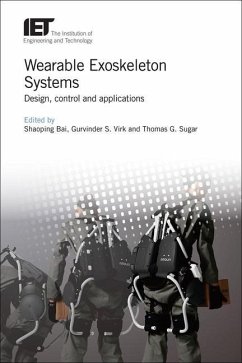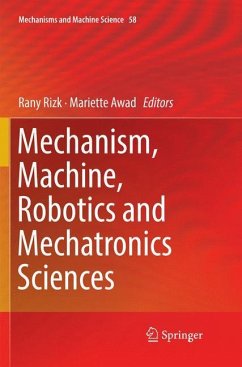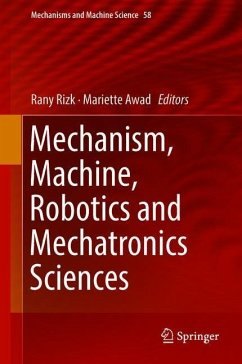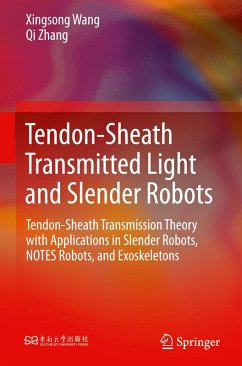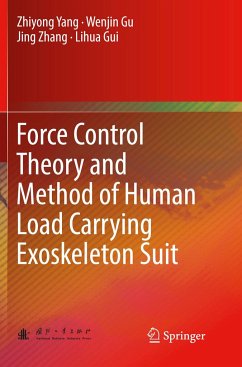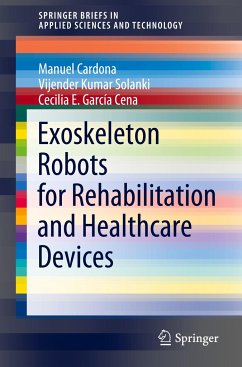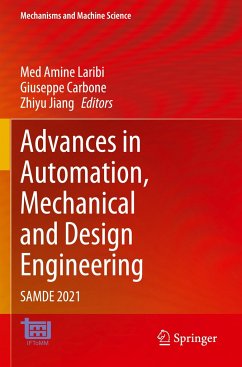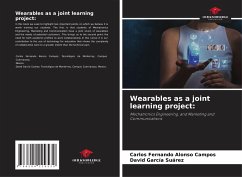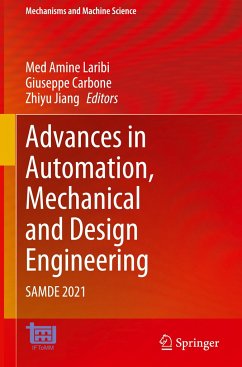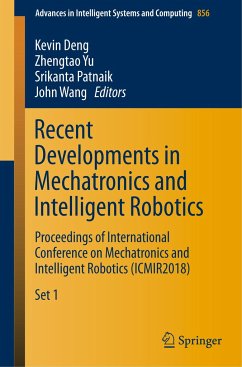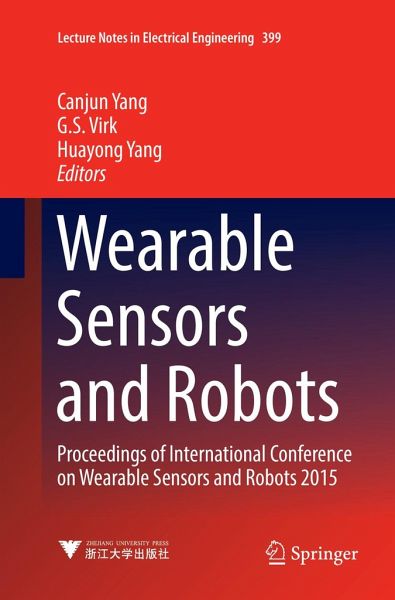
Broschiertes Buch
Wearable Sensors and Robots
Proceedings of International Conference on Wearable Sensors and Robots 2015
Herausgegeben: Yang, Canjun; Virk, G. S.; Yang, Huayong
Versandkostenfrei!
Versandfertig in 6-10 Tagen

PAYBACK Punkte
76 °P sammeln!




These proceedings present the latest information on regulations and standards for medical and non-medical devices, including wearable robots for gait training and support, design of exoskeletons for the elderly, innovations in assistive robotics, and analysis of human-machine interactions taking into account ergonomic considerations. The rapid development of key mechatronics technologies in recent years has shown that human living standards have significantly improved, and the International Conference on Wearable Sensor and Robot was held in Hangzhou, China from October 16 to 18, 2015, to pres...
These proceedings present the latest information on regulations and standards for medical and non-medical devices, including wearable robots for gait training and support, design of exoskeletons for the elderly, innovations in assistive robotics, and analysis of human-machine interactions taking into account ergonomic considerations. The rapid development of key mechatronics technologies in recent years has shown that human living standards have significantly improved, and the International Conference on Wearable Sensor and Robot was held in Hangzhou, China from October 16 to 18, 2015, to present research mainly focused on personal-care robots and medical devices. The aim of the conference was to bring together academics, researchers, engineers and students from across the world to discuss state-of-the-art technologies related to various aspects of wearable sensors and robots.
Dr. Canjun Yang received his Ph. D. degree in mechanical engineering from the Zhejiang University in 1997. Since 1997, Dr. Yang has been a faculty at Zhejiang University. In 2004, he visited Minnesota University. During that time, he joined a deep-sea scientific investigation in voyage AT11-07, and developed a technical research about exploring the deep-sea hydrotherm. In 2011, he visited Monterey Bay Aquarium Research Institute (MBARI), and made a research about submarine observation network in cooperation. A secondary junction box developed in "Submarine Observation Network Junction Boxes" successfully docked with MARS undersea observation network of MBARI, and it worked steadily for 6 months. In 2013, he visited the Applied Physics Laboratory of the University of Washington, Woods Hole Oceanographic Institution, University of Connecticut, and developed research cooperation and academic exchanges. Dr. Yang is currently the deputy dean of Department of MechanicalEngineering Zhejiang University, the member of National Technical Committee Submersible of Standardization, the trustee of China Innovation Strategic Alliance of Rehabilitation Technical Aids, the expert member of International Personal Care Robotic Safety Committee for Standardization (ISO/TC 184/SC 2/WG 7), the expert member of Standardization Technical Committee of Medical Device for international applied robotic technology (ISO/TC 184/SC2 JWG9 Joint ISO/TC 184/SC2-IEC/SC 62A), and work group member of Green Submarine Observation Network (ITU-WMO-UNESCO IOC Joint Task Force) in International Telecommunication Union (ITU).As project leader, Dr. Yang took the responsibility for two projects of National Science Foundation of China, five projects of The National High Technology Research and Development Program of China (863 Program), and more than 20 national and provincial research projects. He co-published 3 books, and published over 150 technical papers including over 50 papers are indexed in SCI/EI. He held over 20 China National Invention Patents. He was awarded the National Technology Invention Award (Second Prize, No. 2), the University Technology Invention Award (First Prize, No. 1) of Ministry of Education of P. R. China, Science and Technology Award of Zhejiang Province (First Prize, No. 2), Zhejiang Youth Science and Technology Award (for individual). He was selected to the national "Ten Thousand Talent Program" expert, "the State Council Special Allowance" expert, The National Ministry of Science and Technology in Innovation of Youth Science and technology Leading Talent, the Program for New Century Excellent Talents in University (NCET) and New Century 151 Talent Project of Zhejiang Province (First Class). Dr. G. S. Virk has a 1st Class BSc degree in Electrical and Electronic Engineering from University of Manchester and a Ph. D. in Control Theory from Imperial College, University of London, UK. He started his academic career in November 1981 as a Research Assistant working with David Owens at the University of Sheffield and has had continuous employment since then working mainly in the UK but with experience working overseas lately where he has gained valuable insight in different cultures and working practices. Dr. G. S. Virk, FIET, C Eng, FIMA, C Math, FCIBSE, is Professor of Robotics and the Built Environment at University of Gävle, Sweden (60%) and Professor of Robotics and Autonomous Systems at KTH Royal Institute of Technology, Sweden (40%). He is a technical and engineering expert with extensive experience of international research and collaboration in a wide range of areas of mobile robotics (wheeled, legged and climbing), personal care robots (including mobility exoskeletons for spinal cord injured persons and assistive aids for the elderly), medical robots, bio-inspired robotics, control theory and its applications, renewable energy and thebuilt sector.His most notable achievements to date are the following:¿Creating the highly successfully EC funded Network of Excellence on Climbing and walking robots (CLAWAR) which has made good contributions to the area of robotics via its pioneering work on robot standardization and robot modularity. CLAWAR still continues as a UK registered charity to advance the area of robotics for the public benefit.¿Leading the creation of the first ISO safety standard (ISO 13482) for non-industrial robots allowing close robot-human interaction including contact; this is due to be published in 2013.¿Creating extensive contacts and networks throughout the main regions of the world active in robotics (China, Europe, Japan, Korea and USA) for collaborations.¿Being head hunted when aged 37 and appointed Professor at University of Portsmouth.¿Being awarded the Freedom of the City of London for his work in promoting IT in schools¿Invited by EC to draft input for robot standardization in the robotics EU Horizon 2020 work program ¿Being recognized as an international expert in robotics by a variety of organizations throughout the world; these include the European Commission, variety of agencies and universities in UK, France, Germany, Sweden, Italy, Belgium, Singapore, Malaysia, New Zealand, China, etc.¿Invited to join University of Gävle, Sweden to a specially created position to initiate new robotic activities aimed at assisting elderly persons¿Invited by China to lead their new proposal on robot modularity standardization. Prof Virk is a leading actor in international robot standardization and is Convener of two robot safety work groups as well as member of the other robot standardization projects. In addition, he is chair of the UK's national committee on robot standardization at BSI. The international groups he chairs are the following:¿ISO TC184/SC2/WG7 Personal care robot safety¿IEC TC62/SC62A & ISO TC184/SC2 JWG9 Medical electrical equipment and systems using robotic technology (i.e. medical robots). Professor Huayong Yang received his B.Sc. from Huazhong University of Science and Technology, China in 1982 and Ph.D. degree from University of Bath, United Kingdom in 1988. He has been with Zhejiang University first as an associate professor in 1991 and the promoted to full professorship in 1996. Professor Yang is a prolific scientist with 65 patents, (co)authored one book titled: "Hydraulic Elevator" and over 160 academic papers published/accepted to be published in international journals and conferences, including the IEEE /ASME Transactions on Mechatronics, ASME Journal of Dynamic Systems, Measurement and Control, IEEE Transactions of Control Systems Technology, IFAC Control Engineering Practice, etc. Professor Yang is active in major international conferences, he hasbeen a Technical/Program Committee member of international conferences such as 2011 IEEE/ASME International Conference on Advanced Intelligent Mechatronics, 8th Hangzhou International conference on Fluid Power and 9th NSFC International conference on Frontiers of Design and Manufacturing, and he is the IPC chair of 2013 IFAC Symposium on Mechatronic Systems. Professor Yang is the Cheung Kong Chair Professor of Zhejiang University and the director of National Engineering Research Center of Electrohydraulic Control since 2000. He is Fellow of the Chinese Mechanical Engineering Society and has severed as the director of the State Key Laboratory of Fluid Power Transmission and Control at Zhejiang University from 1997 to 2001. He is the chief scientist of a project "Fundamental Scientific Issues in Full-Face Large Scale Excavation Equipment Design and Manufacturing" supported by the National Basic Research Programme of China (973) in 2007. He has been a committeemember of the advanced manufacturing technology of the National High Technology 863 programme of the Ministry of Science and Technology (MOST), China since 2000. The "863" and "973" programmes are major national initiatives designed to boost China's research infrastructure and help it meet the demand for socio-economic growth and sustainable development. He has also served as a member of the academic committee of four state key laboratories at four different leading Universities, which include the Fluid Power and Mechatronic Systems lab at Zhejiang University, the Digital Manufacturing Equipment and Technology Lab at Huazhong University of Science and Technology, the Mechanical Systems and Vibration Lab at Shanghai Jiaotong University and the Mechanical Transmission Lab at Chongqing University. He has won several national awards, such as the National Outstanding Researcher of the Natural Science Foundation of China, the National Scientific and Technological Progress Prize and three Ministerial or Provincial Scientific and Technological Progress Prize (First Class). He has served as an Editor for the Chinese Journal of Mechanical Engineering, Transactions of the Chinese Society for Agricultural Machinery and Manufacture Information Engineering of China. His research interests are in motion control and energy saving of mechatronic systems, fluid power component and system development.
Produktdetails
- Lecture Notes in Electrical Engineering 399
- Verlag: Springer / Springer Nature Singapore / Springer, Berlin / Zhejiang University Press
- Artikelnr. des Verlages: 978-981-10-9607-5
- Softcover reprint of the original 1st ed. 2017
- Seitenzahl: 600
- Erscheinungstermin: 30. April 2018
- Englisch
- Abmessung: 235mm x 155mm x 33mm
- Gewicht: 908g
- ISBN-13: 9789811096075
- ISBN-10: 9811096074
- Artikelnr.: 52615246
Herstellerkennzeichnung
Springer-Verlag GmbH
Tiergartenstr. 17
69121 Heidelberg
ProductSafety@springernature.com
Für dieses Produkt wurde noch keine Bewertung abgegeben. Wir würden uns sehr freuen, wenn du die erste Bewertung schreibst!
Eine Bewertung schreiben
Eine Bewertung schreiben
Andere Kunden interessierten sich für


